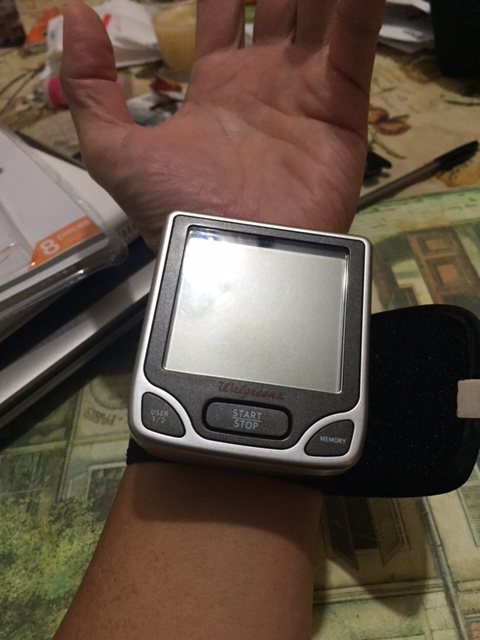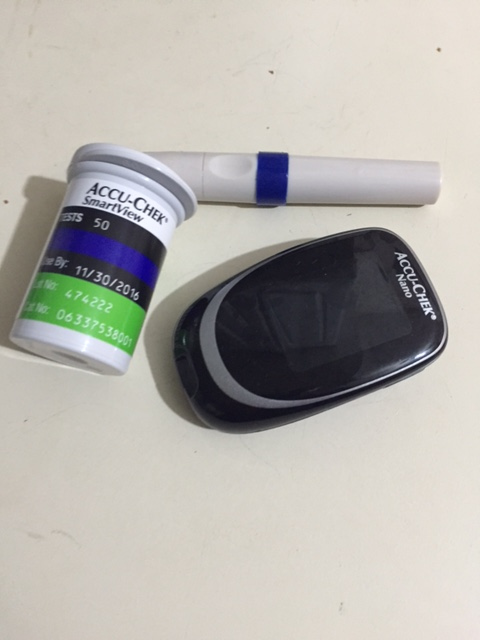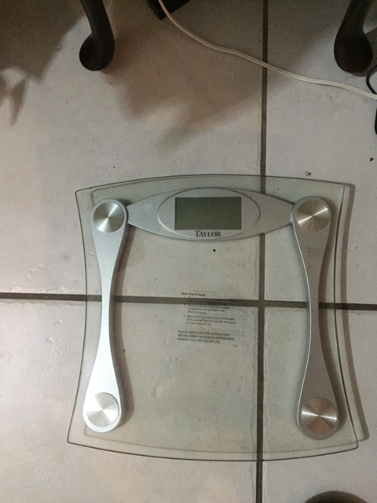
Four days ago, I was told my cousin died. They said he did his usual daily routine: in the morning he left home to open his store, then he left his store to go to the city hall to renew his business license. He returned home for lunch. He passed by our house around one pm, laughing and sharing a joke with my brother on his way back to reopen his store in the pm. Alone in the store, he fell unconscious. He remained non-responsive. He was pronounced dead on arrival in the hospital.
Though I deal with strokes, heart attacks, traumatic brain injuries, accidents everyday in my place of work, I was still shaken and frightened by the news. My cousin’s demise is closer to home. His death felt like mine too because we came from the same origin, we grew up in the same environment, we ate similar food and drank the same water, we were neighbors all our lives and he was only eight years older than me. There is this warning voice that says, ‘if it can happen to him, it can happen to me too.’ No one of course could live forever. I know I too would die one day. But so soon?
There are many things we hope we could accomplish before we die. Many of us have this anticipation to live a little extra to see our kids become parents themselves, to see our grandchildren, to be strong and active enough to teach them how to fly a kite, or ride a bike or a horse or for them to hear the stories of our past. We’d like to have that extra time to explore places we’ve always wanted to see, learn things we’ve always wanted to understand and enjoy, celebrate one more holiday or reunion with our family, old classmates, friends, old playmates, neighbors, community. There are so many things we must do before the journey is over.
My cousin, alas, had his journey prematurely end due to massive heart attack.
Most people would attribute that to fate but is there any way to alter this kind of fate? Based on current medical and health literature and evidences, it is possible to alter it but requires proactive approach.
By now, we are probably aware of the things that predisposes a person to heart attack. Family history, congenital or undiagnosed or misdiagnosed heart disease, sedentary lifestyle, obesity, smoking, poor food choices, stress, complications from medical procedures, bad interactions of medications, hypertension, diabetes, high cholesterol, these are a few of the multilayered possible causes of heart attacks. In fact I can even add sudden change in lifestyle or activity or weather or level of excitement or emotion that can potentially lead to it.
It also means that one of these or a combination of these factors can attack your heart. It could also be a single massive attack or a culmination of many lesser attacks until the proverbial ‘last straw broke the camel’s back’ happens. Given all these knowledge at our disposal, why then do we still have this statistics?
Approximately 71 million Americans have one or more type of cardiovascular disease, with 40% of them over age 65 years. Each year 450,000 deaths due to heart attack and heart failure occur before patients can reach a hospital or emergency room.
450,000 deaths similar to my cousin’s death. The frightening truth behind these numbers is - some of us live assuming we are not counted among those 450,000, we are exempted.
The heart may be our best friend now but it is a sneaky friend, it is silent if it is damaged, does not tell you if it’s working properly or not, it pretends to be ok when it is not, and when it is finally ready to admit and succumb to its failure, it may be too late. So - we all need to check it every now and then. Much like the engine of a car, we can probably get away with troubles when it’s brand new, even subject it to a lot of stress but somewhere in time, especially when it has accumulated too many mileage, and the warranty is over, we might want to lift up the hood to take a good look at it, listen to its sound, its roar, its spin, its impact on the performance of the whole body.
I am very conscious of the CVD(cardiovascular disease) everyday not only because I see its victims in my line of work, I am also at an age when people I know suffer from its devastating impact. And it is absolutely essential for me to not only educate myself but also apply the current evidence-based preventative measures against it.
There are a few things we can do to determine if we have CVD or high risk for developing CVD. Check with the MD. An ordinary visit may read your BP, a quick EKG, pulse, weight. A quick blood test can determine your blood sugar, A1C, cholesterol, among others. You don’t really need to spend a lot of money for this visit and battery of tests, actually these are covered 100 percent by most health insurance companies. A thorough investigation by your physician may prove to be a big security blanket in your life.
Assuming you’ve got high flying marks as far as your Physician is concerned, don’t become complacent and start eating anything, smoking and getting lazy because, as I've stated before, there is such thing as proactive approach to health. This is where other professionals (including me) can get involved. Now, I don’t imply you need to hire Nutritionists and Nurses and Physical Therapists, Wellness coaches and Personal trainers etcetera (hey if you can afford them why not?) to maintain good health but these are the people you might want to consult with if you don’t know anything about keeping good health or if you want motivation. But unless you’ve been living in a dark cave for the last 20 years, you must already have an idea as far as managing your health is concerned. Some of us may need additional push from professionals but others have this internal capacity to manage their own health once they set their minds into it. Some of us may need a car technician to do every mundane job for our cars but some, well, they can handle majority of its maintenance. I am one of them.
As a healthcare worker, it is imperative that I practice what I preach. I am not the smoking Respiratory Therapist or the morbidly obese Personal Trainer. Being healthy goes with the profession. I don’t know everything about being healthy, let me clear that up first, but I try to educate myself about it everyday. I learn through books, internet, my patients and myself. Being sick is very scary. Being healthy is heaven. That is quite clear to me.
But to avoid being sick, and in this case, having a CVD, there are a few steps I must do to keep it at bay. And most of these are given: no smoking, eating right, exercise, avoiding stress, avoiding extremes, good sleep and rest, and taking appropriate medications to manage my my risks to CVD. I have Diabetes type 2 and borderline hypertension.
So far, I have dodged the bullet. But only because I see my MD regularly, take my meds, monitor my biometrics periodically and live the healthy lifestyle I am preaching about. Should I ignore these steps, I have a high risk of developing CVD on top of the complications resulting from diabetes. My life’s quality and quantity are dependent on as simple as doing something about my health or doing nothing about it.
For lifestyle management, I do not smoke, I do not drink, I am not interested in illicit drugs, I try to eat appropriately, exercise almost everyday between 1 hour to more, complete my sleep, avoiding being stressed at work. I would like to have more time to indulge in yoga and pilates. I maintain my BMI at 23 (160 lbs). I used to be greater than 25 (181 lbs). I lost more than 20 pounds by simple self discipline and desire to lose. I do not subscribe to any magic diet formula except eating the right way and the right kind. (See my Diet section).
For exercise, I do love running and I can run from 5 miles to 15 miles in one session. At 53, I am more into ‘running for health’ instead of competition. In the real world, a person may just need 30 minutes of moderate exercise (walking briskly for example) to be assured of daily dose of exercise. Overdoing may not be something for you. I do long runs only because I have been doing them for the last 10 years. And I am preparing for a half marathon. I also include (and this is important) resistance training, endurance training and stretching in my weekly dose of physical activities. Soon I’d like to incorporate yoga and pilates into my routine.
For medical management, I see my MD as he deems appropriate. I am very interested with my BP, daily blood sugar, AIC, cholesterol, metabolic panel, EKG(if I feel some abnormal heart beats). My blood work is done every three months but my BP, pulse rate, blood glucose, weight are metrics I can check as often as I can. I need some instruments for these and they come cheaply at any drugstore, supermarket or amazon.(See photos). Right now I am taking metformin and lisinopril. And I am hoping to limit my meds with these two. Being cheap that I am, I get them free from Publix.
This is what I use for regular BP readings
What I use for blood sugar monitoring
Everybody should have a weighing scale to live a healthy lifestyle
Now that my cousin is buried and his family are picking up the pieces he left behind, I sit on my chair and wonder what could have been the alternative world that might have prevented his premature demise. I heard that in the morning, he casually mentioned to my brother that he was feeling not his regular self, like having the flu. Then, he had a very excitable day, leaving his store and going to the city hall to renew his business license involving falling in line and waiting for hours. It was also mentioned that he ran out of BP medications for 2 days and went to the drug store to pick his new supply. He did not check his BP. He went to lunch which was salty, (according to his wife), and still skipped taking his BP med as he walked back to his store at around 1 pm. It was the hottest temperature of the day. He collapsed soon after.
In the alternate world, he should not have skipped his BP med for 2 days, he also should have checked his BP the moment he felt different first thing he woke up. Next, he should have avoided the excitement of the morning and rested especially when he did not feel well. Maybe, just maybe, if the BP was controlled first thing, the heart attack could have been prevented or if not, lessened in severity.
Maybe the BP control held the key, or maybe it was not that simple.
It was also rumoured is that he had an undiagnosed heart disease : a congenital heart condition or heart rhythm problem or cardiomegaly that had he made an appointment to a cardiologist to treat it, he would still be alive today.
There are many possibilities and rumours. So many post-mortem theories. But we can not beat a dead jose back to life.
The best alternative scenario for my cousin was that he checked with MD and had a Cardiology follow up if an unknown cardiac pathology was suspected. And then he did regular monitoring of his overall cardiovascular health and got a little proactive to minimize his risks. Then maybe, just maybe, he would still be alive today.
I still mourn his loss no matter what.
CVD Definition by Mayo Clinic Staff
Heart disease describes a range of conditions that affect your heart. Diseases under the heart disease umbrella include blood vessel diseases, such as coronary artery disease; heart rhythm problems (arrhythmias); and heart defects you're born with (congenital heart defects), among others. The term "heart disease" is often used interchangeably with the term "cardiovascular disease." Cardiovascular disease generally refers to conditions that involve narrowed or blocked blood vessels that can lead to a heart attack, chest pain (angina) or stroke. Other heart conditions, such as those that affect your heart's muscle, valves or rhythm, also are considered forms of heart disease.
Many forms of heart disease can be prevented or treated with healthy lifestyle choices.


